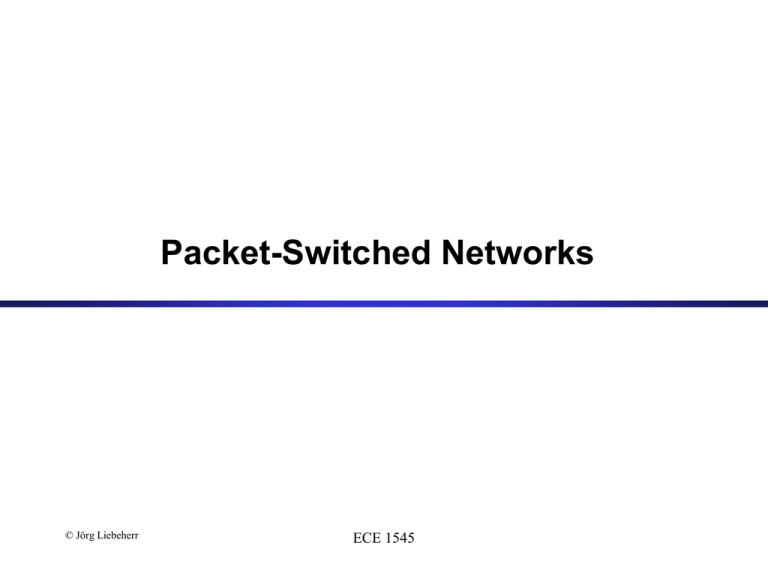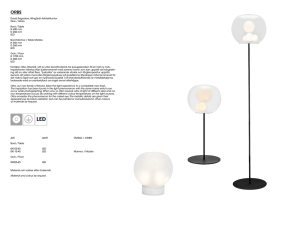1545-13-CommNetworks
advertisement

Packet-Switched Networks © Jörg Liebeherr ECE 1545 Communication Networks • A generic communication network: end system node Communication Network Other names for “end system”: station, host, terminal Other names for “node”: switch, router, gateway ECE 1545 Taxonomy of Networks • Communication networks can be classified based on the way in which the nodes exchange information: Communication Network Circuit-Switched Network Frequency Division Multiplexing Packet-Switched Network Datagram Network Time Division Multiplexing Wavelength Division Multiplexing ECE 1545 Virtual Circuit Network Packet Switching • • Data are sent as formatted bit-sequences, so-called packets Packets have the following structure: Header Data Trailer • Header and Trailer carry control information • Each packet is passed through the network from node to node along some path (Forwarding/Routing) • At each node the entire packet is received, stored briefly, and then forwarded to the next node (Store-and-Forward Networks) • Packet transmission is never interrupted (no preemption) • No capacity is allocated for packets ECE 1545 A Packet Switch input queues output queues switch fabric memory ECE 1545 Timing of Datagram Packet Switching Host Node 1 Transmission delay Host Node 2 3 4 Packet 1 Packet 2 Packet 3 Packet 1 Packet 2 Packet 3 Packet 1 Packet 2 Packet 3 ECE 1545 Datagram Packet Switching C B C.2 C.1 C.1 C.2 1 2 C.1 C.2 5 A.1 A.3 A.2 4 A A.1 A.2 A.3 A.3 C.2 A.1 A.2 A.3 D 3 A.1 A.2 A.2 7 ECE 1545 A.2 6 E Timing of VC Packet Switching Host Node 1 Host Node 2 3 4 VC Establishment Transmission delay Pkt1 Pkt2 Pkt3 Pkt1 Pkt2 Pkt3 Pkt1 Pkt2 Pkt3 VC Termination ECE 1545 Virtual-Circuit Packet Switching C.2 VC 2 B C C.1 C.1 C.2 1 3 C.1 5 A A.1 VC 1 D 2 C.2 4 A.1 A.2 A.3 C.2 A.3 A.2 A.1 C.1 A.1 A.3 A.2 7 A.2 A.3 ECE 1545 6 E Packet Switching Technologies • Both packet switching technologies are used today: • Datagram packet switching: – IP routers (Internet) – Ethernet Switches (Switched LANs) • Virtual-circuit packet switching – Asynchronous Transfer Mode (ATM) – Multi-protocol label switching (MPLS) ECE 1545 Packet Switch Architectures ECE 1545 Packet Switches • Different types of packet switches: – IP routers – ATM switches – MPLS switches – Ethernet (LAN) switches – Frame Relay • All types of packet switches have very similar characteristics ECE 1545 Switch Components • Hardware components of a router: – Network interfaces – Interconnection network – Processor with a memory and CPU Processor Memory CPU Interconnection Network Interface Card ECE 1545 Interface Card Interface Card Basic Architectural Components Per-packet processing Routing Table Routing Decision Routing Table Forwarding Decision Routing Table Forwarding Decision Switch Fabric Output Scheduling Functional Components routing protocol Routing functions routing protocol routing table updates Control routing table Datapath: routing table lookup per-packet processing Forwarding Incoming packets outgoing packets ECE 1545 Routing and Forwarding Routing functions include: – route calculation – maintenance of the routing table – execution of routing protocols Forwarding is per-packet processing • On high-end packet switches routers, forwarding is highly parallelized, and most work is done on the interface cards ECE 1545 IP Router • Lookup packet destination address in forwarding table. – If known, forward to correct port. – If unknown, drop packet. • Decrement TTL, update header checksum. • Forward packet to outgoing interface. • Transmit packet onto link. © Jörg Liebeherr, 2005 ECE 1545 ATM Switch • • • • Look up VCI/VPI of cell in VC table. Replace old VCI/VPI with new. Forward cell to outgoing interface. Transmit cell onto link. © Jörg Liebeherr, 2005 ECE 1545 Ethernet Switch • Lookup frame destination address in forwarding table. – If known, forward to correct port. – If unknown, broadcast to all ports. • Learn source address of incoming frame. • Forward frame to outgoing interface. • Transmit frame onto link. © Jörg Liebeherr, 2005 ECE 1545

